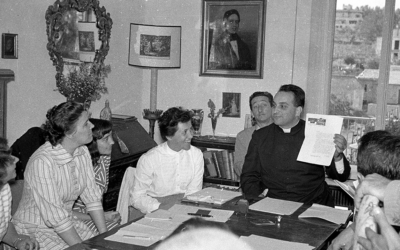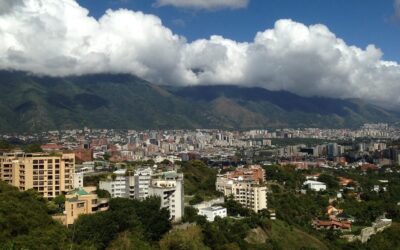For over two years, on the initiative of NetOne, the international network of communicators of the Focolare Movement, a group of communication professionals, has been meeting online every month to explore themes related to the Synod of Bishops, in particular on synodality and communication. Key elements during these meetings include listening, silence, testimony and fraternal communication. In addition to these regular sessions, two webinars have taken place over the past two years: the first in April 2024 (an in-depth analysis is available online here) and the second in February 2025 entitled, “What kind of communication for synodality?” (VIDEO) This event was followed in various parts of the world with the participation of numerous communication experts connected from several countries.
Alessandro Gisotti, deputy director of Vatican Media, opened the series of interventions by citing three essential terms for a good communicator: Communication, Action and Community. He said, “In this Holy Year, we need a synodal communication that is able to accompany the people who will come, without the presumption of wanting to lead them but available to listen to them, to accompany them, to share a part of the journey together”.
From the United States, Kim Daniels, Professor at Georgetown University in Washington DC, Coordinator of the Synod of Study Group 3 explained, “Mission in the digital environment – our goal is to offer actionable recommendations to the Holy Father for the improvement of the Church’s mission in this digital culture, ensuring that it remains firmly rooted in our call to meet people wherever they are, leading them towards a deeper communion with Christ and with each other”.
Pál Tóth, a Professor at the Sophia University Institute in Loppiano, spoke from Hungary, explaining that “healing the deep wounds of the globalized world requires transversal collaboration including with those whose views differ from our own. The idea of differentiated consensus promotes a new type of social relationship: we collaborate for the realization of some values while remaining on different platforms for others”.
The starting point of the Synod is those on the margins. This emerged from the experience of Muriel Fleury and Beatrice Binaghi, respectively Head of Communication and Social Media Officer at the Dicastery for Integral Human Development. “Speaking for those who are exploited or marginalized by dominant processes means making these people visible. Without these countercurrent voices, everything would favour those who dominate, because silence supports those who mistreat, enslave, exploit, or render too many men and women invisible “. Binaghi described the collaboration network created among the “border bishops” responsible for migratory pastoral care in Colombia, Costa Rica and Panama, especially to address the critical situation in Darien through which hundreds of migrants pass every day. “Dialogue and communication have created communities, and the work that was previously fragmented is now more synergistic and impactful”.
The actress Stefania Bogo was asked to give two moments of reflection through an artistic reading of selected passages from the recent encyclical of Pope Francis, Dilexit nos and Chiara Lubich’s “The attraction of modern times”.
Erica Tossani, of the Presidency of the Synodal Assembly of the Italian Church, explained how important it is to listen, that “it is not merely a passive action, a silence waiting to be filled by the words of others. It is an active attitude that involves attention, discernment and a willingness to be challenged. Without listening, communication degenerates into polarization and sterile opposition”.
The experiences of synodality included that of Paolo Balduzzi, correspondent for the Italian Rai 1 program “A sua immagine”. He explained, “The stories told arise from a dialogue shared with the entire editorial team. For me, every interview is an encounter. And synodality begins with this encounter with my interlocutor, that is, entering into their story, into their lived experience and together seeking to grasp the most essential aspects of their story”.
The story of Mariella Matera, blogger of Alumera, a space for evangelization on social media, is the story of a communicator fascinated by the idea of transmitting the Gospel through the internet. She asked herself, “How can I be a little bridge between the web and Christ? In the Calabrian (southern Italy) dialect, the word Alumera refers to the old type of oil lamp. Just as the lamp, as long as it has oil, does not go out, so too I, as long as I have the love of Christ in me, cannot be silent”.
In conclusion, Anita Tano, head of communication for United World Project-NetOne Argentina recounted the experience of Genfest 2024 in Brazil, the youth event of the Focolare Movement which had the theme Together to Care. Featuring cultural exchanges, art and workshops, the aim was to recognise communication as a tool to take care of “one’s own life, that of others and that of the planet”. A message that emphasized the difference between simply being “connected” and being truly “united.”
The live broadcast was moderated by Enrico Selleri, presenter and author of the Italian Church broadcasters Tv2000 and InBlu2000, along with Sara Fornaro, editor-in-chief of the web version of the Italian magazine Città Nuova. The event was promoted by NetOne together with the General Secretariat of the Synod of Bishops, the Dicastery for Communication, the Dicastery for the Service of Integral Human Development, Vatican Media, the Synodal Way of the Church in Italy, TV2000, InBlu2000 and SIR (of the Italian Episcopal Conference), the Sophia University Institute, Weca (Association of Italian WebCatholics), the Città Nuova Editorial Group and the Pontifical University of the Holy Cross.
For more information and to stay in touch: net4synodcom@gmail.com
www.youtube.com/@SynodalCommunicationNetwork
Lorenzo Russo
Photo: © Pixabay




0 Comments